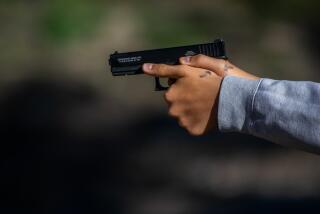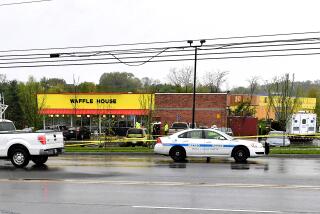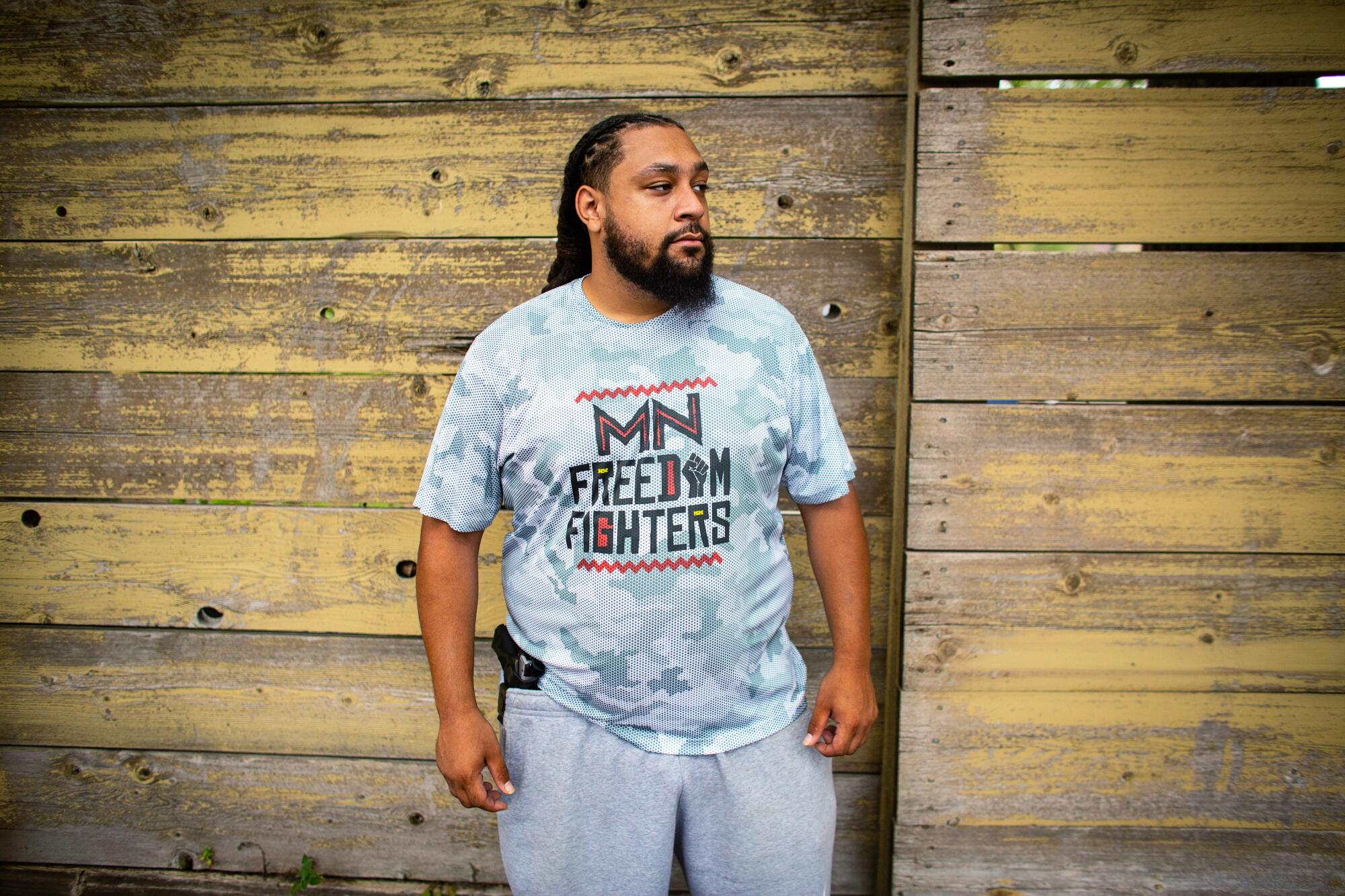
MINNEAPOLIS — Before he drove to the grocery store parking lot, Romeal Taylor did the same thing he’s done every day this summer — he holstered his 9-millimeter handgun to the waistband of his gym shorts until he could feel it hug his right hip.
When he arrived at the store in north Minneapolis he spotted six other Black men, some in tactical gear, armed with Glock 23s and Smith & Wesson M&Ps. One of them beamed when he spotted Taylor and hugged him.
“Bro, good to see you,” Taylor said, muffled through a face mask.
They had come together for a meet-and-greet to introduce themselves to the community, marking one of the first public gatherings of the Minnesota Freedom Fighters.
The ad hoc group of about two dozen men — including a retired firefighter, a healthcare worker and a veteran — formed in the days after George Floyd’s killing in response to the local NAACP chapter putting out a call for residents in predominantly Black north Minneapolis to protect small businesses from destruction as fires and unrest engulfed the city.
Heeding the call, the men — who would meet at a local cafe — stood watch outside small businesses for several nights in late May and early June. More recently, they have patrolled neighborhoods, offering security to protesters, and have been in regular communication with city officials about protests they plan to attend.
“It’s important to have men from the community step up for the community,” said Sasha Cotton, director of the city’s Office of Violence Prevention. “It’s their right to be out on the streets and it’s commendable. There are Black residents who in the early days of the unrest felt vulnerable ... and still do.”
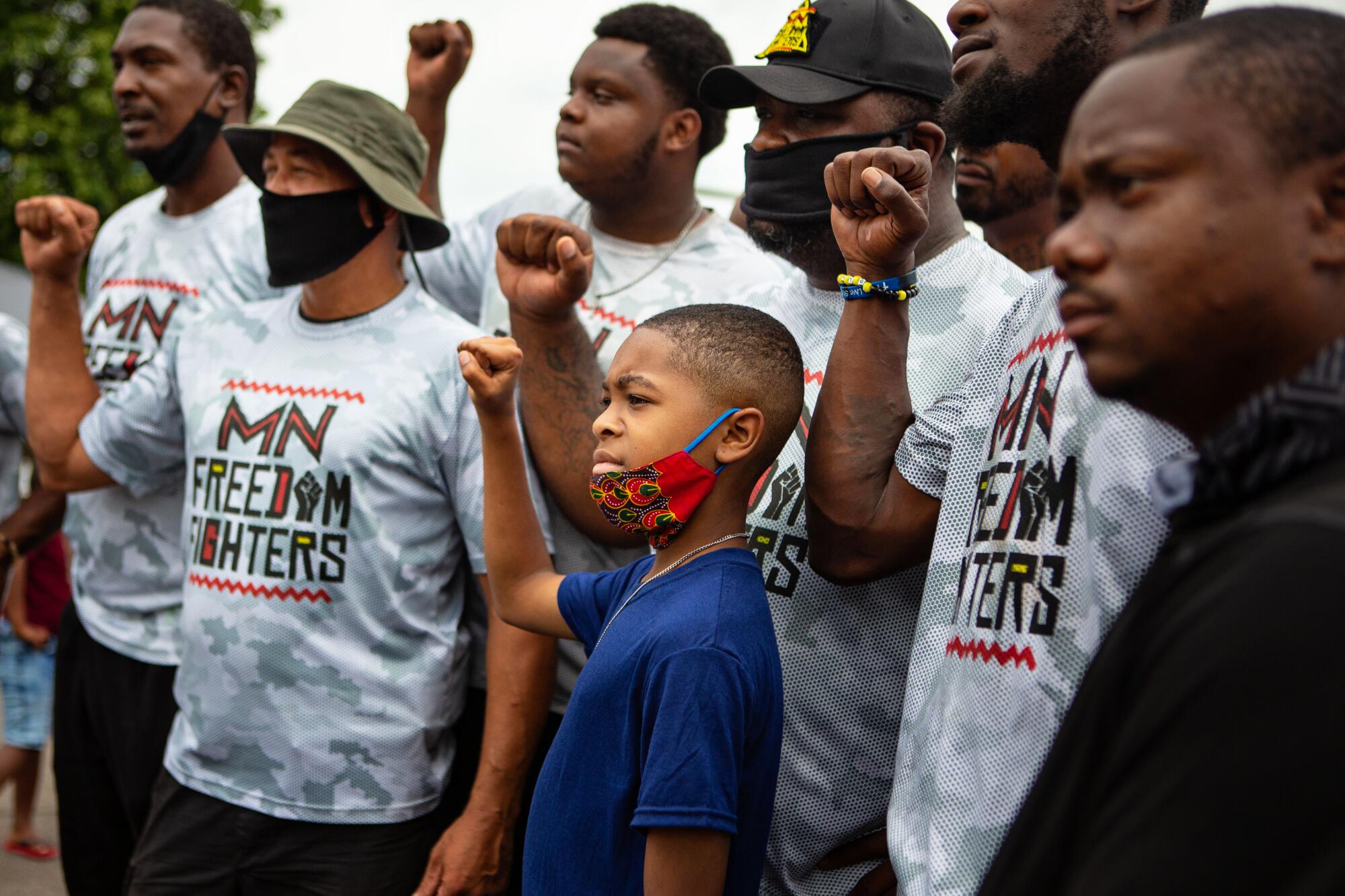
Cotton said the Freedom Fighters have also met with Minneapolis Police Chief Medaria Arradondo, who is Black, and they’re in touch with precinct commanders.
A spokesman for the Minneapolis Police Department declined repeated requests for comment. At a summer Freedom Fighters event, a patrol officer stopped and posed for selfies with members of the group during a 30-minute visit.
These brothers were there in the beginning, when threats were being made by white supremacists. There is no doubt they stepped up for the community.
— Leslie Redmond, president of the Minneapolis NAACP
Leslie Redmond, president of the Minneapolis National Assn. for the Advancement of Colored People, said she is happy the men are armed and wants them to grow as community leaders.
“These brothers were there in the beginning, when threats were being made by white supremacists,” she said. “There is no doubt they stepped up for the community.”
Taylor and other members view the group as a way to provide safety for peaceful protesters. But they also understand that Black men armed with legally registered guns are viewed differently by many in law enforcement and other parts of society than, say, white militia members who stormed state capitols waving their firearms without repercussions in recent months.
Nonetheless, he said, “We are like any other American.... We have the right to bear arms.”
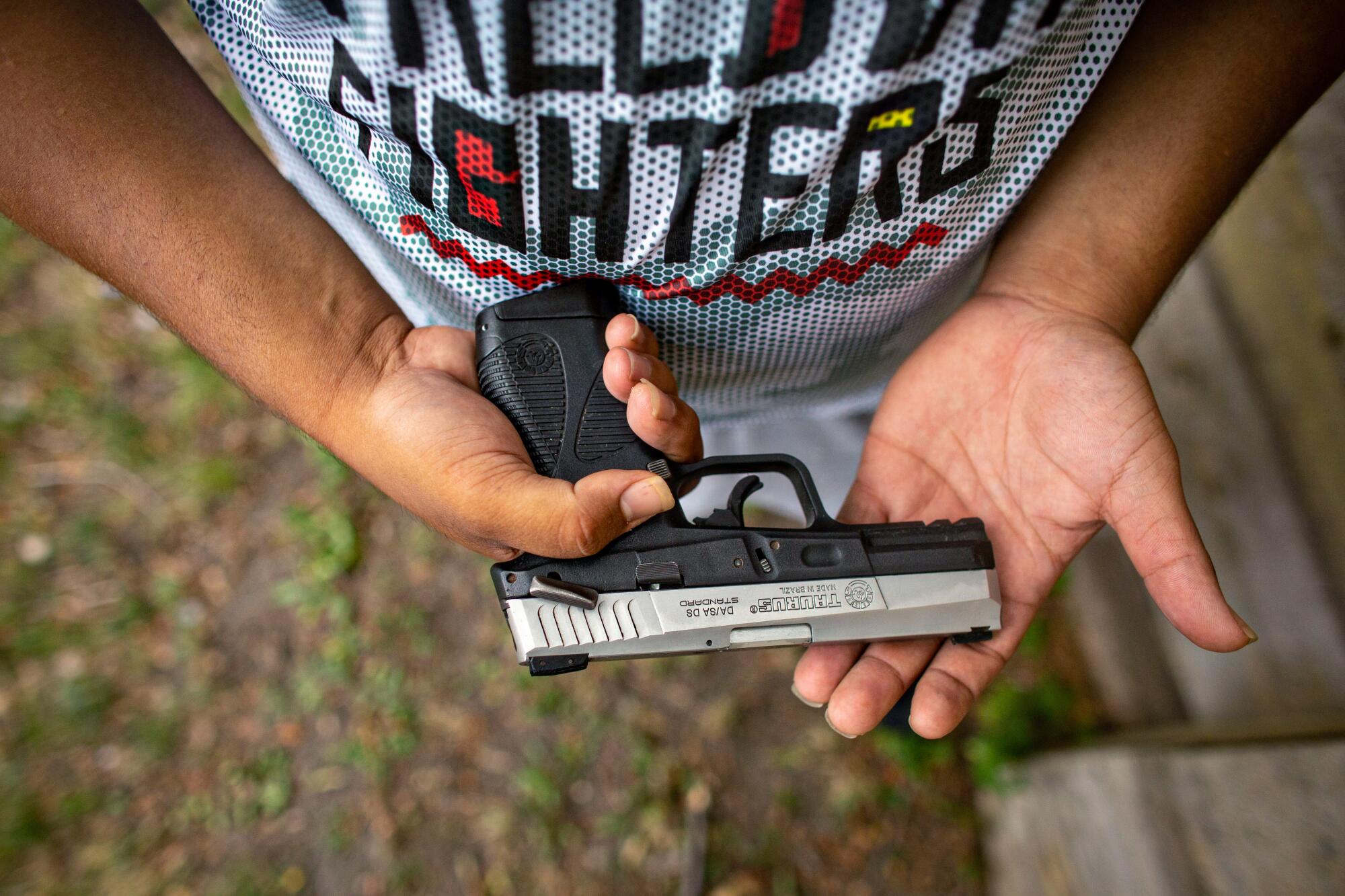
Months after Floyd was killed in Minneapolis police custody, as national unrest over police brutality toward Black people has mixed with partisan politics, deadly incidents have occurred in Kenosha, Wis., and Portland, Ore., involving armed, self-styled civilian security operatives.
In Kenosha, Kyle Rittenhouse, a white Illinois teenager who traveled across state lines with a military-style rifle, is accused of killing two white men who were protesting the police shooting of Jacob Blake, a Black man who was struck multiple times in the back during an arrest. Rittenhouse was not apprehended by police at the scene but was arrested later on homicide charges; his attorneys argue the 17-year-old was acting in self-defense.
Near Portland, meanwhile, Michael Reinoehl, 48, a white man who had provided armed security to protesters, was killed by federal agents in a hail of gunfire as they sought to arrest him in the shooting death of a member of a far-right group. Before his death, which government agents claim occurred when he pulled out a weapon as they confronted him, Reinoehl had told a reporter that he had acted to protect the life of a companion when the man he shot attempted to attack them.
Members of the Freedom Fighters say their objective is to avoid confrontations by working hand in hand with authorities and making clear that they are prepared to defend their community. They also say they aim to de-escalate situations so that police do not get involved, because calling the police has sometimes led to encounters in which unarmed Black men have been killed.
Because of its cooperation with city officials, the group is not fearful the police will attack them. In their view, they are an added layer of security in the community.
The Freedom Fighters’ mission statement reads: “Our objective is not to be the police, but the bridge to link the police and the community together.”
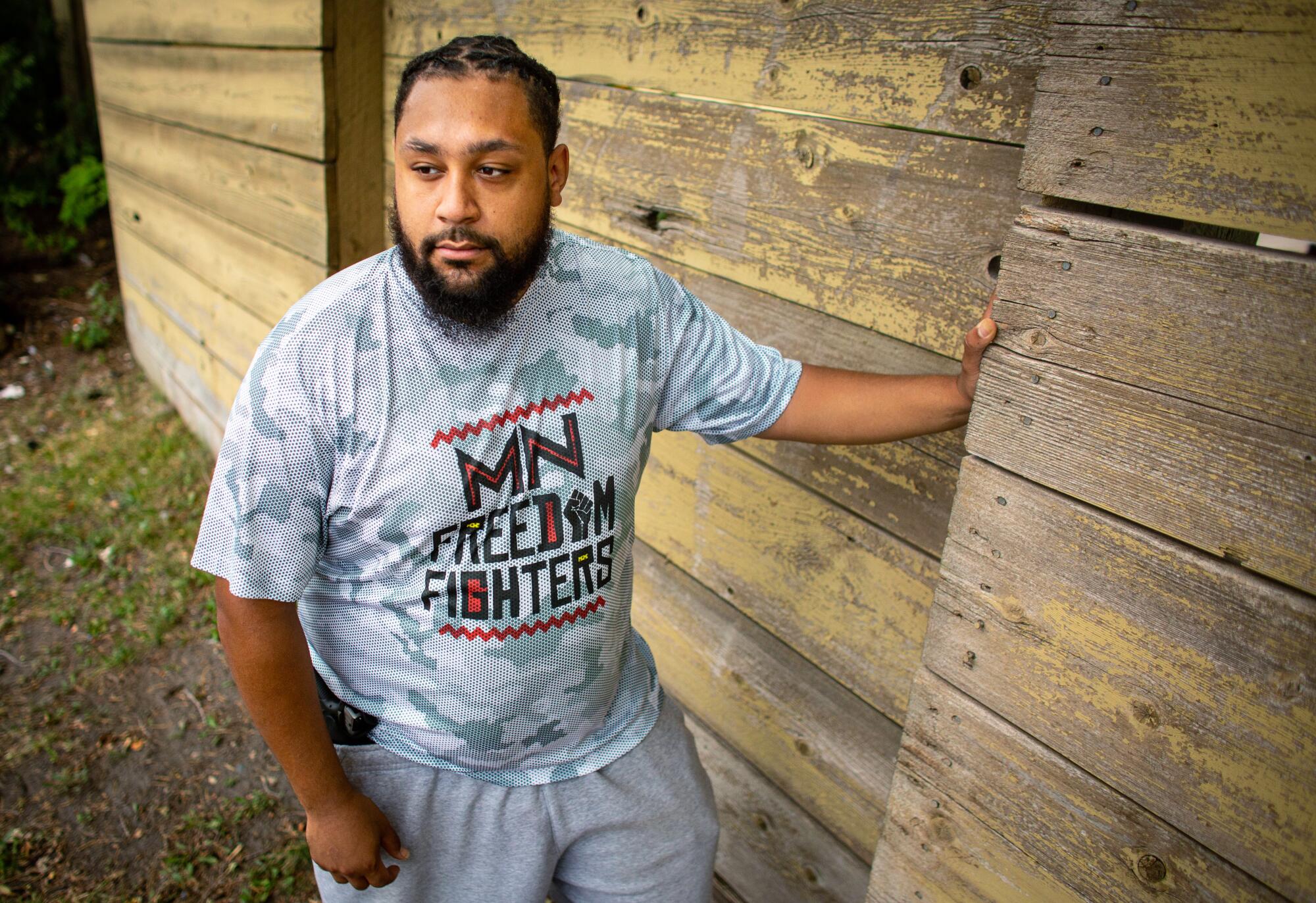
In addition to marching in the streets of their hometown, some have traveled to Louisville, Ky., in support of protesters demanding justice for Breonna Taylor, the 26-year-old Black woman who was shot to death inside her apartment in March by police carrying out a no-knock warrant.
Amid calls for justice and an end to systemic racism, dozens of armed Black groups have sprung up across the nation. Such groups have marched through city streets in Atlanta and Detroit and have gathered at Stone Mountain in Georgia.
After Ahmaud Arbery, a Black man, was shot to death after being confronted by white men while out for a jog in a Georgia neighborhood in February, members of a Black militia group called NFAC — the full name of the coalition uses an expletive to explain that they’re not messing around — showed up with long guns and tactical vests in Brunswick, Ga. Weeks later, some 1,500 members went to Stone Mountain, calling for the removal of Confederate monuments there and elsewhere. The group, along with other protesters, engaged in a peaceful march.
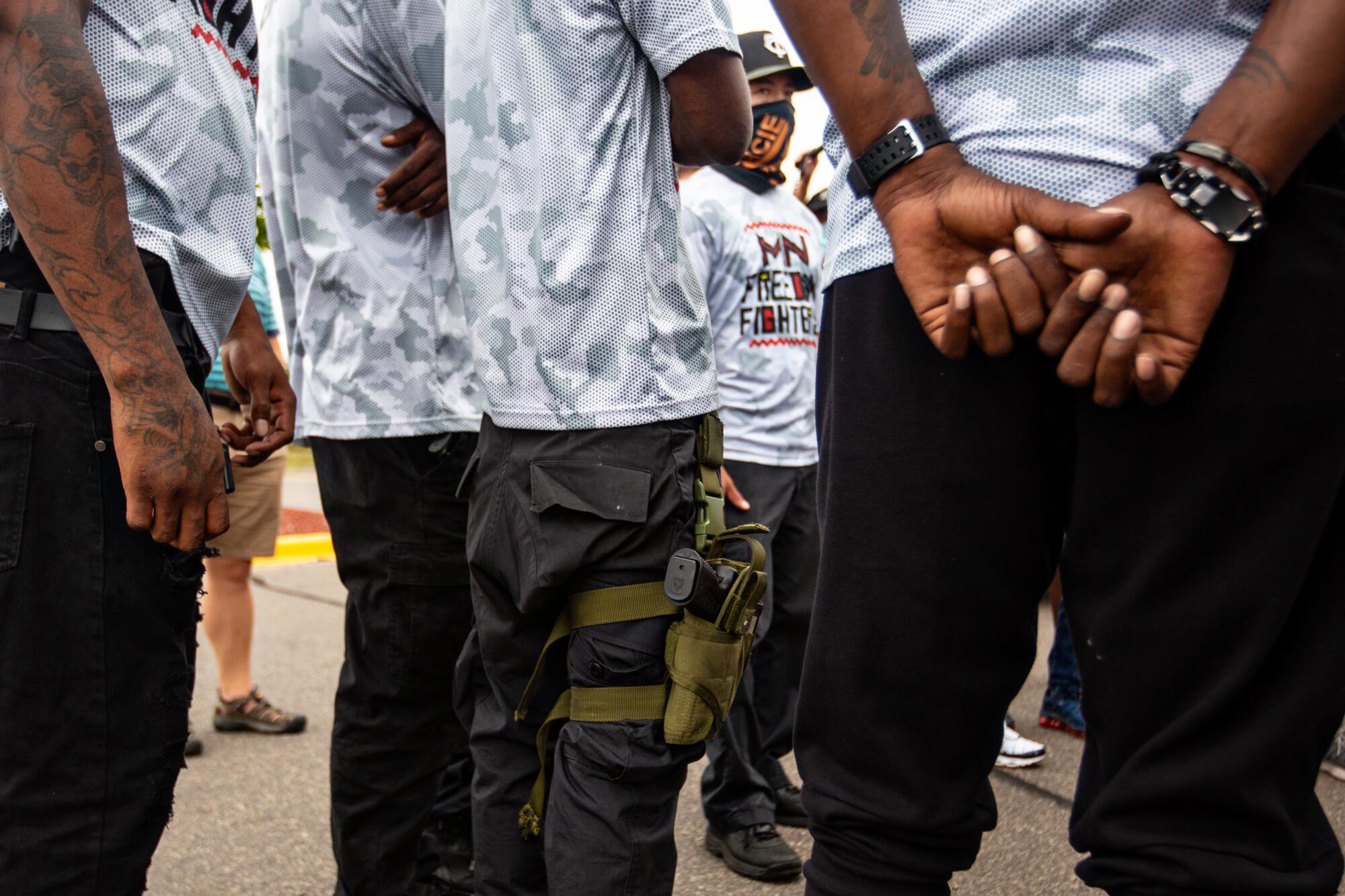
Recently, similar groups have patrolled gatherings in Kenosha, where protesters demand justice for Blake.
While armed Black groups hark back to the 1960s Black Panther movement and its armed citizen patrols, the modern iterations by and large do not share the same policing-the-police viewpoint.
The fate of the Black Panthers serves as a case study for the long-standing risks felt by Black men who legally carry firearms. Local and federal law enforcement agencies, including the FBI, ceaselessly surveilled the group and wound up shooting to death some of its leaders, including Fred Hampton in Chicago.
Outrage by white society to the Panthers carrying weapons, which they had lawfully purchased to conduct armed patrols of predominantly Black Oakland neighborhoods, was such that then-California Gov. Ronald Reagan signed a gun control measure known as the Mulford Act that prohibited Californians from carrying loaded firearms to protests.
This is about filling the gap we see between police and community. ...It’s really about harm reduction.
— Robert Sayers, a Minneapolis fire inspector and member of the Minnesota Freedom Fighters
At this point, 36% of white people nationwide own a gun, according to the Pew Research Center, compared with 24% of Black people.
Fears concerning Black gun ownership are nonetheless a raw reality for many people in Minneapolis.
In a nearby suburb in 2016, Philando Castile, who had a licensed firearm, was killed by police during a traffic stop after he let an officer know that he had a legal weapon.
:::
For Romeal Taylor, 28, who works as an overnight security guard at a local hotel, owning a gun has always been about personal protection. For the last six years, he’s carried a firearm with him anytime he goes out in public. He understands he can be viewed as a threat, but he’s also a trained and proud gun owner.
“There is a lot going on out here in the world,” he said. “I would rather have a gun and not need it than need it and not have it.”
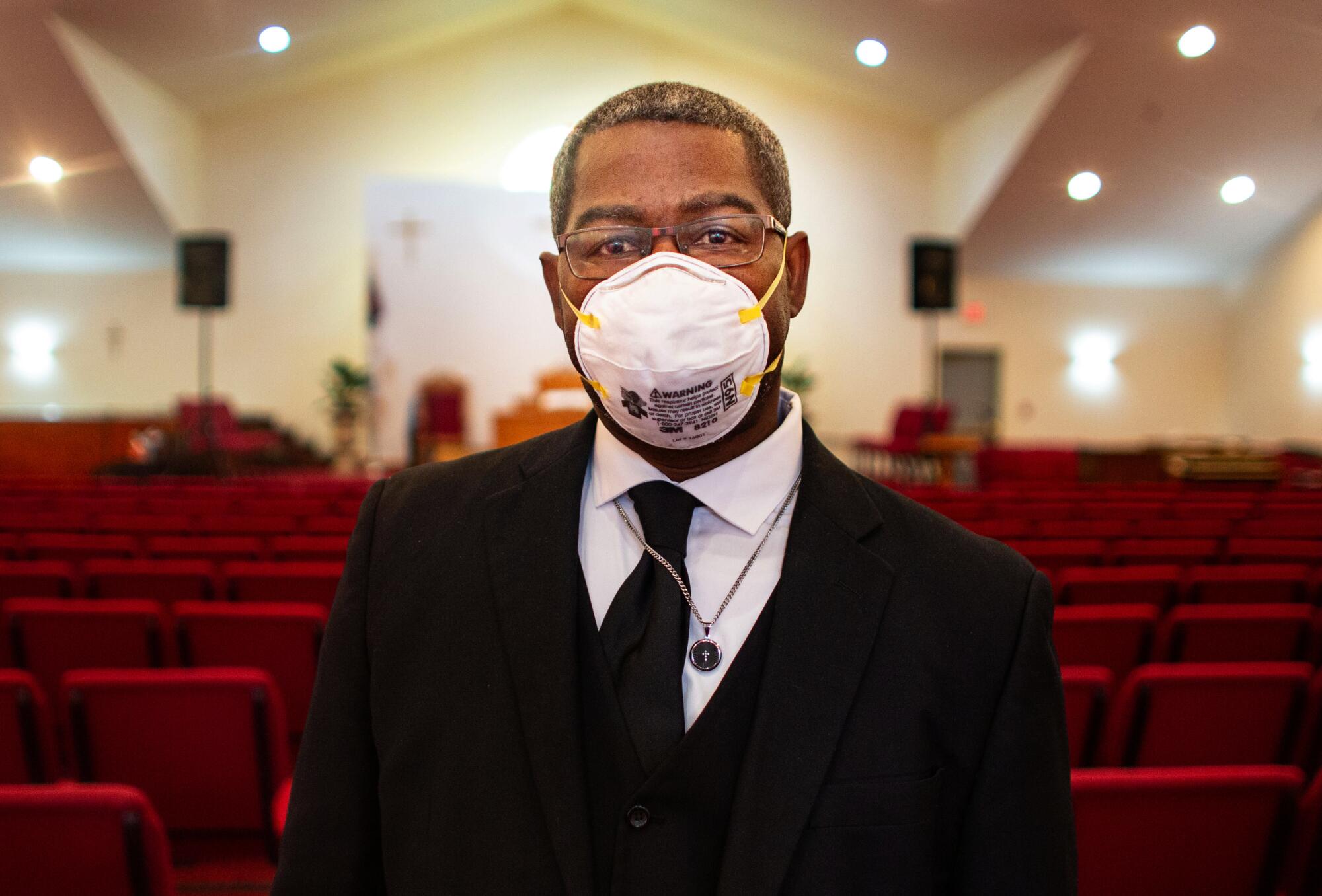
Days after Floyd was killed, Taylor said, he heard from neighbors in north Minneapolis about a call to action for licensed gun owners to protect local businesses from vandalism and destruction. The call resonated with him, he said, because he had been frustrated to see people he didn’t recognize from his neighborhood destroying buildings.
“These weren’t Black folks,” he said. “These were outsiders truly intent on destroying this city.”
The group’s headquarters was Sammy’s Avenue Eatery along a bustling thoroughfare.
It’s where Taylor met Randy Chrisman and other local Black gun owners like himself. Chrisman, who lives in the suburbs, read the NAACP call to action on Facebook and showed up at the cafe.
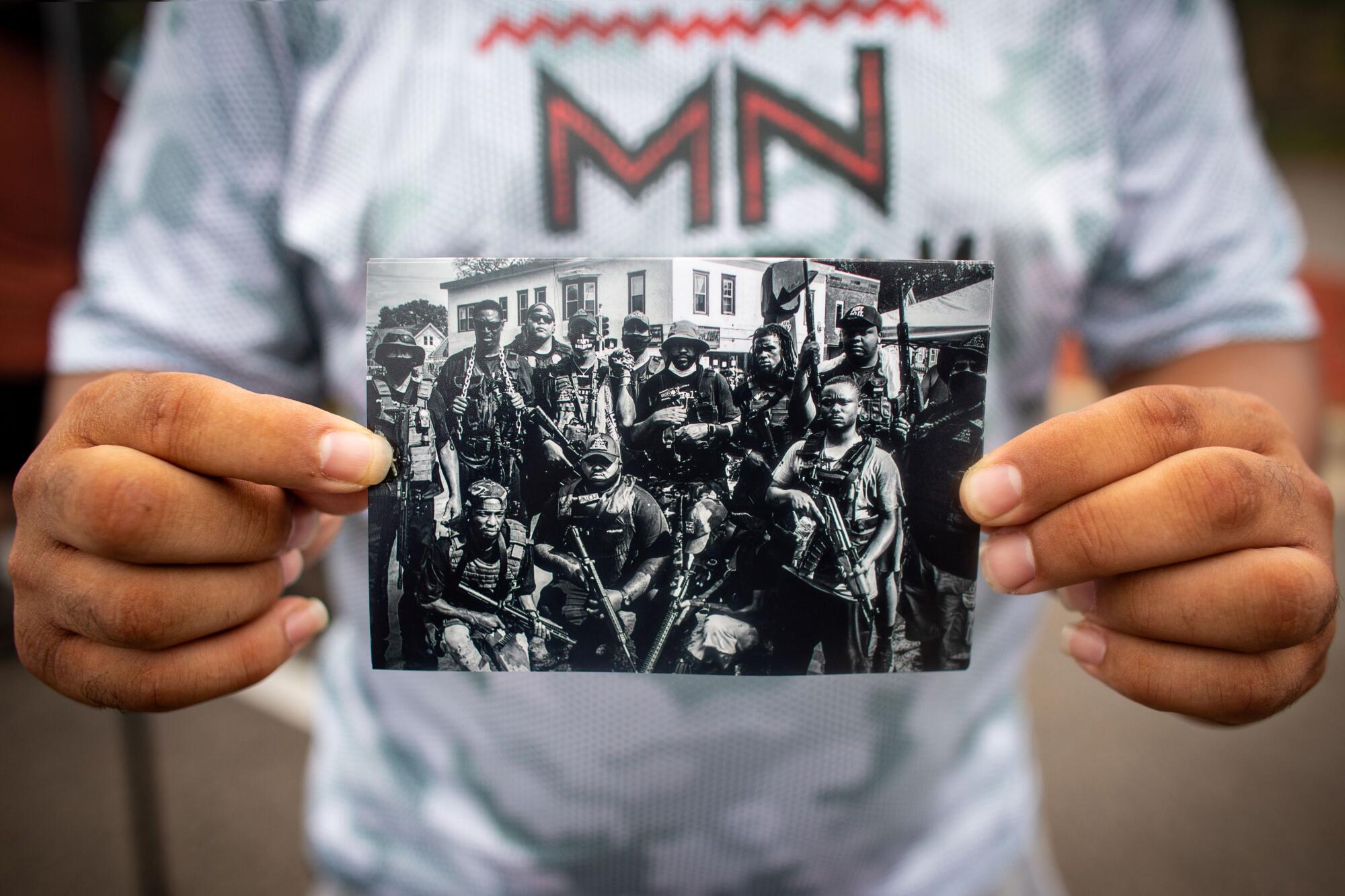
“It’s been a brotherhood ever since,” said Chrisman, who has had his concealed carry permit for nearly a decade and typically carries his handgun with him.
“You just never know when something is going to happen,” he said. “As a Black man, I have the same rights as others to also carry a firearm and I do it.”
In the evenings after Floyd’s death, Chrisman would leave his job at a restaurant in the suburbs and drive into the city. He can still hear the sound of the National Guard Humvees barreling past him and the hum of helicopters overhead as he holstered his Glock. He had to work to steel his nerves during their long nights of patrolling.
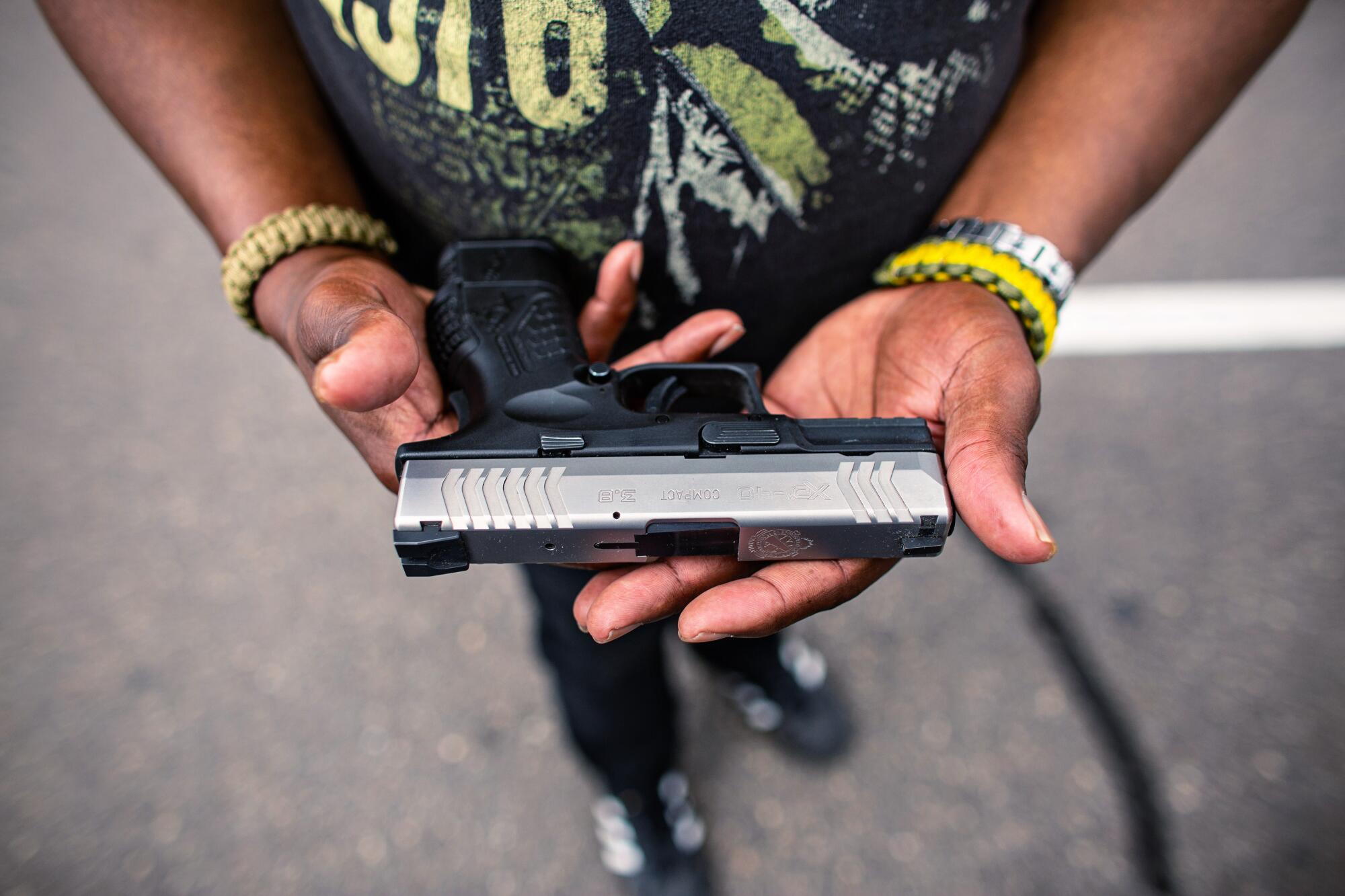
“You have to be prepared to take action if needed,” Chrisman said. “It’s something I’m ready to do. I don’t want to, of course, but I’m ready if needed.”
During the patrols and at backyard barbecues and other events they’ve held together, the men have formed a kinship, giving one another nicknames, such as “Sarge” and “Roach.” They feel lucky to have found one another — a group of like-minded thinkers who value their right to bear arms and support racial equity, but who don’t view the police as the enemy.
“This is about filling the gap we see between police and community.... It’s really about harm reduction,” said Robert Sayers, a fire inspector for the city of Minneapolis and member of the Freedom Fighters.
It’s been a breath of fresh air. Seeing an armed Black man — knowing he is here to take care of the community, nurture the community — is a blessing.
— Pastor Tim Christopher, a member of the Minnesota Freedom Fighters
Sayers got involved after witnessing outside groups — white supremacists, he says — burning properties around the area where Floyd was killed. He wanted to help protect Black-owned businesses.
“We could not and still cannot allow destruction in the city,” the 52-year-old said.
Others in the community see the Freedom Fighters as allies.
The Rev. Tim Christopher, whose church is in north Minneapolis, has a concealed carry permit and packs during church service on Sundays. Christopher, who has testified at the state Capitol in St. Paul in recent years in support of the 2nd Amendment, says he felt comforted the first time he saw members of the Freedom Fighters in his neighborhood.
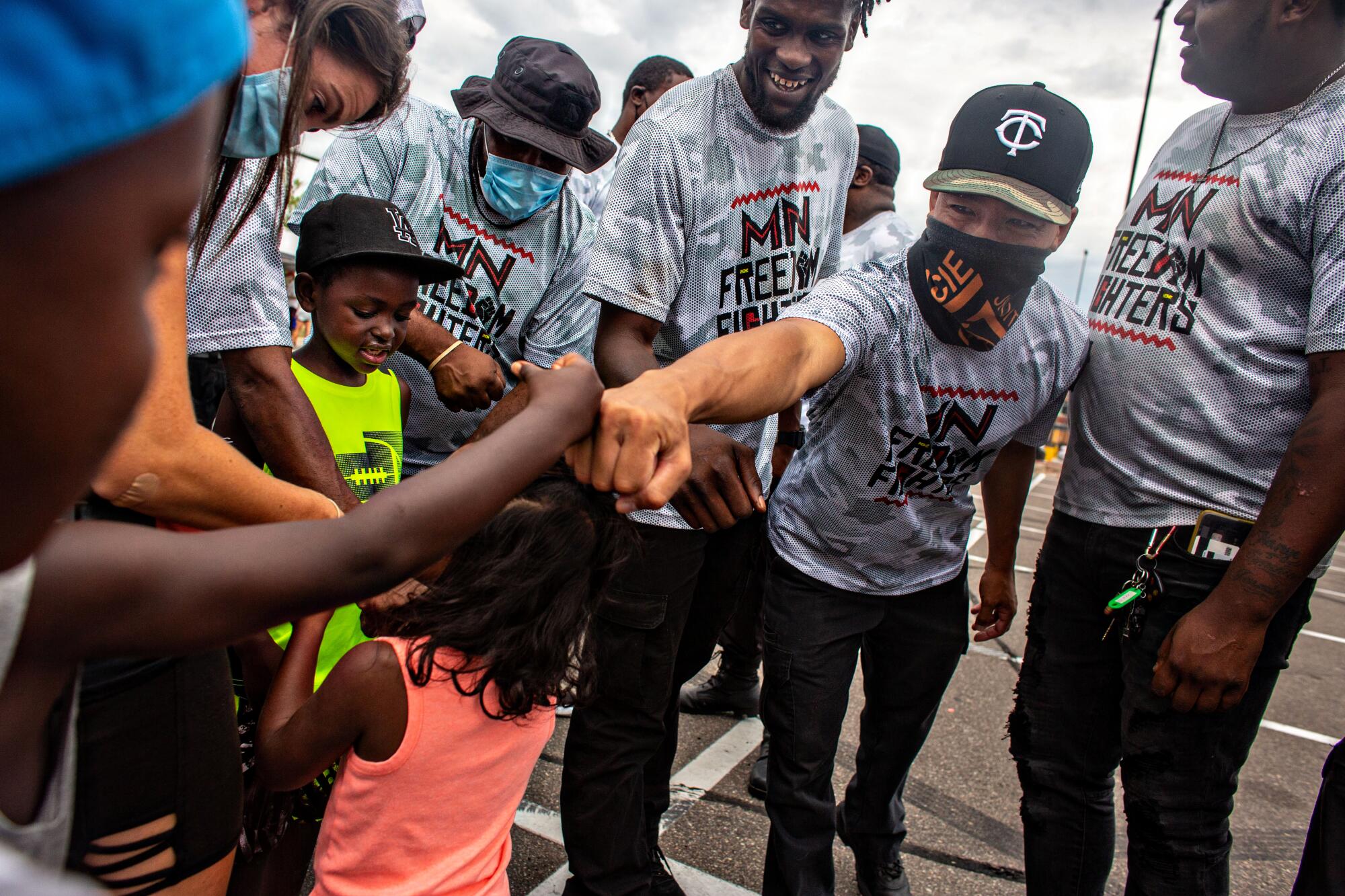
“It’s been a breath of fresh air,” he said. “Seeing an armed Black man — knowing he is here to take care of the community, nurture the community — is a blessing.”
But Christopher also knows the risks of carrying as a Black man.
When he drives while carrying his handgun, he thinks about Castile and others like him. If he gets stopped by police, he said, he doesn’t tell them he has a firearm until they ask.
“At that point, my hands are on the steering wheel and I say, ‘Yes, officer, I have a firearm and it’s legal,’” he said. “They always back up and place a hand on their gun.… There is a stigma, and they’re scared of Black men with guns.”
On a recent afternoon, Christopher stood with the Freedom Fighters in a grocery store parking lot. Some of the guys grilled hot dogs and burgers as R&B played in the background. Kids screamed as they played tag near an inflatable playhouse that was flapping in the afternoon breeze.
“We want to show all the good we can do for and in the community,” Taylor said.
Later, one of the Freedom Fighters handed printouts of group photos the men took in the days after Floyd’s death. They showed the group armed — AR-15s, Glocks, tactical vests, bandannas — near the intersection where Floyd was killed.
A little boy gripped one of the printouts and looked up at Taylor with a pen.
“Oh, he wants your autograph,” said the boy’s mother.
As Taylor leaned over and swiftly signed the back of the photo, he turned to the young child’s mother.
“Be sure to let us know if you all ever needed anything, for real,” he told her.
She nodded and clinched her fist in a salute.
More to Read
Sign up for Essential California
The most important California stories and recommendations in your inbox every morning.
You may occasionally receive promotional content from the Los Angeles Times.

